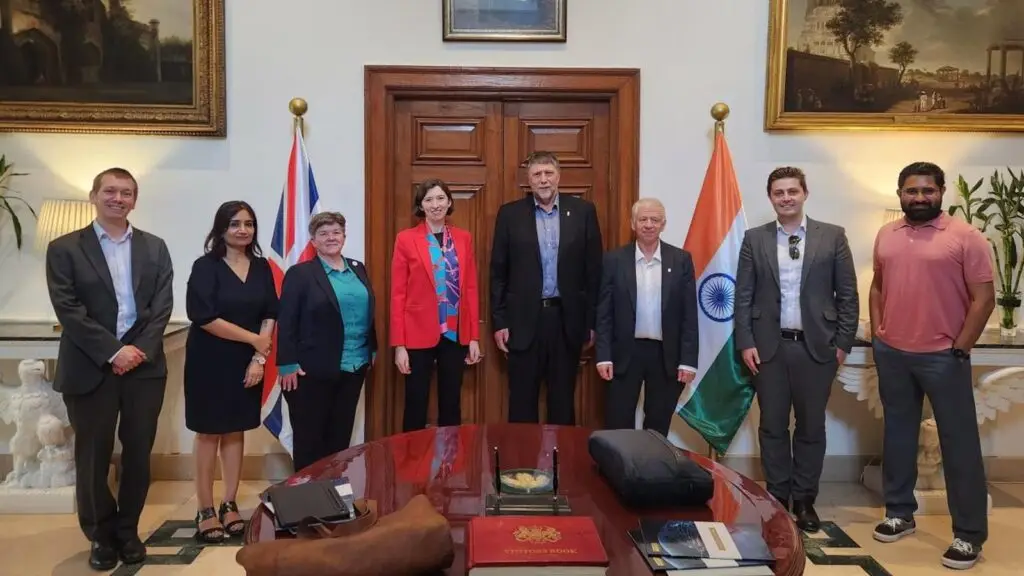The National Graphene Institute at the University of Manchester is now a crucial component of the new UK-India Technology Security Initiative (TSI).
Announced during Foreign Secretary David Lammy’s visit to India, this initiative aims to enhance economic growth by focusing on critical areas like telecoms security and semiconductor supply chain resilience.
Collaboration for Economic Growth and Security
The National Graphene Institute at the University of Manchester is set to be a key player in the new UK-India Technology Security Initiative (TSI). This initiative aims to foster economic growth and address issues such as telecoms security and semiconductor supply chain resilience. The announcement was made during a visit to India by Foreign Secretary David Lammy.
Partnerships and Advanced Materials
The National Graphene Institute will collaborate with the University of Cambridge Graphene Centre and the Indian Institute for Science Bengaluru Centre for Nano Science & Engineering. This partnership will focus on advanced two-dimensional (2D) and atomically thin materials, as well as nanotechnology. “The launch of the Technology Security Initiative further strengthens The University of Manchester’s commitment to India as a high priority country across all our key areas of activity,” said Professor Stephen Flint.
Ongoing Collaborations in India
The University of Manchester is already engaged with multiple partners in India. These collaborations have led to joint PhD programmes with the Indian Institute of Technology Kharagpur and the Indian Institute of Science, Bengaluru.
These programmes incorporate a number of projects focused on 2D materials. Such efforts underscore the university’s long-term commitment to research and educational partnerships in India.
Official Statements and Reactions
Lindy Cameron, British High Commissioner to India, expressed enthusiasm about the initiative. “The UK-India Technology Security Initiative will help shape the significant science and technology capabilities of both countries,” she said.
“We are delighted to have The University of Manchester play a key part in this, particularly in our collaboration on advanced materials and critical minerals,” added Cameron.
Focus on Research and Education
The initiative will include partnerships in research fields spanning science and engineering, medicine and health, and humanities.
It will also involve graduate student training and shared taught course delivery. These elements will help build a robust educational framework between the two nations.
The focus on graduate student training is particularly noteworthy, as it will prepare the next generation of researchers and professionals.
Impact on Telecommunications and Supply Chains
One of the primary goals of the TSI is to enhance telecoms security in both countries. This is crucial for safeguarding communication networks and ensuring data integrity.
Another significant objective is to improve semiconductor supply chain resilience. Addressing this issue is vital for preventing potential disruptions in technology manufacturing.
By focusing on these key areas, the initiative aims to bolster economic stability and technological advancement.
Advanced Materials and Critical Minerals
The collaboration will delve deep into advanced materials and critical minerals. These are essential for various high-tech applications and industries.
Research in this area will contribute to advancements in fields ranging from electronics to renewable energy.
This aspect of the partnership highlights the strategic importance of materials science in modern technology.
Strategic Importance and Future Prospects
The UK-India Technology Security Initiative is not just about immediate gains but long-term strategic importance.
It aims to build a sustainable framework for ongoing collaboration between the two nations.
The initiative’s focus on advanced materials, telecoms security, and semiconductor supply chains positions it as a cornerstone for future technological progress.
In summary, the UK-India Technology Security Initiative is set to impact both economic growth and technological advances significantly.
With The University of Manchester at the forefront, this initiative promises to strengthen collaborations in key areas like telecoms security and semiconductor supply chain resilience.
The partnerships formed will pave the way for further developments in advanced materials and other essential fields, ensuring a robust techno-economic future for both nations.

